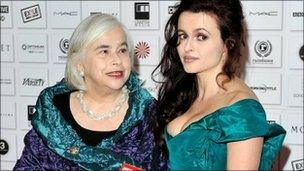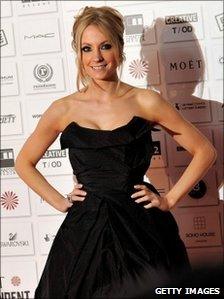King's Speech reigns at British Independent Film awards
- Published
The King's Speech dominated the British Independent Film Awards
Colin Firth's latest film, The King's Speech, has won five prizes at the British Independent Film Awards.
The period drama, which earned him the best actor prize for his role as the stammering King George VI, also won best British independent film.
Carey Mulligan won the award for best actress for her role in the big-screen adaptation of Kazuo Ishiguro's best-seller, Never Let Me Go.
Both films will be released in the UK early next year.
Firth called The King's Speech "an improbable story about people who could have been consigned to the footnotes of history, and nobody's told it before.
"It was taken as a risk - somebody found the money - and I think it will pay off."
The film also took best supporting actor honours for Helena Bonham Carter and Geoffrey Rush, with an additional prize going to screenwriter David Seidler.
Yet Firth, who is attracting Oscar buzz for his role, refused to speculate on its chances during awards season.
"It could end tonight," he said. "It's already punched above its weight.
"It already got noticed at the festivals, it's funnier than we thought, it has the capacity to make people cry.
"I can't project myself into glories that aren't in place yet."

Best supporting actress Helena Bonham Carter attended the awards with her mother, Elena
Bonham Carter admitted she was "slightly apprehensive" about the attention surrounding the film.
"There's so much hype, I just hope people don't get immensely disappointed and resent it deeply when they see it," she told the BBC.
The awards, known as the Bifas, were hosted by actor James Nesbitt and took place at Old Billingsgate Market in London.
Bonham Carter was also presented with the Richard Harris award for outstanding contribution by an actor to British film.
Elsewhere actor Liam Neeson received an award from variety magazine for his part in focusing the international spotlight on Britain.
Monster success
Carey Mulligan, Oscar nominated for last year's An Education, said she hadn't expected to win for Never Let Me Go.
She admitted she had told her mother to stay at home instead of joining her at the ceremony, as she had done last year.
"Now I regret that," Mulligan said.
"But it's at home in London where I grew up, and to have a platform to talk about our small independent films is amazing."
Newcomer Gareth Edwards beat veteran Mike Leigh in the best director category for his low-budget film Monsters, which opened in UK cinemas this weekend.
Monsters also won awards for best achievement in production and best visual effects, created by Edwards on a computer in his bedroom.
"I always wanted to make a monster movie," said Edwards.
"With my background in digital effects, I felt like an alien invasion and giant monsters weren't out of the question."
Yet he admitted feeling uncomfortable about beating the likes of Leigh, The King's Speech director Tom Hooper and Kick-Ass director Matthew Vaughn.
"I didn't want to make eye contact with anyone when I walked up there," he said.

In Our Name was best newcomer Joanne Froggatt's first film role
"I feel embarrassed because they are heroes of mine. We made this small little film and these guys are going to go and win Oscars."
Joanne Froggatt, seen recently in ITV1's period drama Downton Abbey, picked up most promising newcomer for her debut film role in In Our Name.
The film tells of a female soldier who returns from a tour of duty in Iraq with post-traumatic stress disorder.
"It means so much to me, but so much to our film as well," she said.
"We were on such a micro-budget and everybody worked so hard and became really passionate about the subject matter.
"I've been a professional actress for 14 years but this my first role in a film and it's also my first award for my acting," the former Coronation Street star added.
"So to have the two together is an absolute dream come true. With the success of Downton Abbey too this year has just been phenomenal."
The Douglas Hickox award for best first-time director went to Clio Barnard for The Arbor.
French crime thriller A Prophet, meanwhile, was named best foreign film.
- Published17 November 2010
- Published1 November 2010